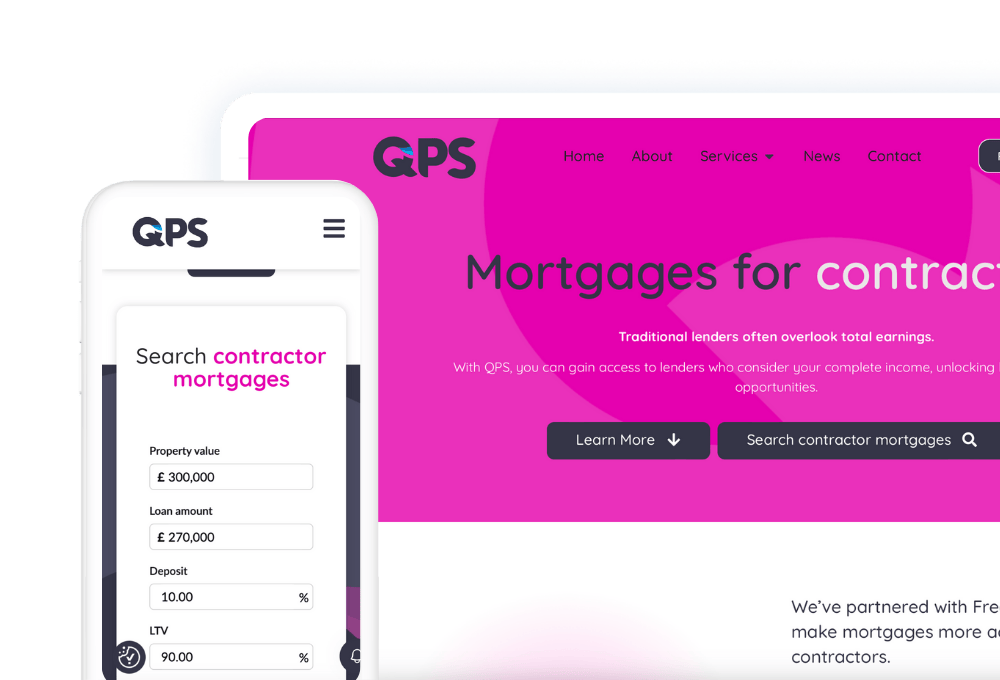Have you had trouble securing a mortgage because you're a contractor? You're certainly not the only one, and there are many reasons why this happens.
As someone working as a contractor or operating your own limited company, you’ve probably been given plenty of advice—whether you wanted it or not. Often, this advice paints a bleak picture, leading you to believe that a long financial history is required before you can even think about getting a mortgage. But that’s not necessarily true.
There are many misconceptions, many of them outdated, that might discourage you from pursuing your contractor business or mortgage goals. We’ve heard enough of these to know that it’s time to clear up some confusion.
This short guide will break down the myths and give you a clearer understanding of how contractor mortgages actually work—and how being a contractor could even improve your chances of becoming a homeowner!
Do I need three years of accounts to qualify for a mortgage?
No, you don’t. As a contractor, you can secure a mortgage based on your current contract rate, and this has been the case for many years. You don’t need to show years of contract work or provide extensive accounts.
Some specialised mortgage brokers have established unique agreements with top lenders to cater specifically to contractors. Many of these lenders are well-known, big-name banks that you’ve likely heard of—and may have even approached before without success.
These tailored mortgage terms allow contractors to get a mortgage using just their contract as proof of income. That long list of accounts others might ask for isn’t relevant to your current situation.
What you’ll need is fairly simple: your contract, a valid form of ID, an updated CV, and three months of bank statements. That’s it!
Does my contractor status limit how much I can borrow?
Not necessarily. Lenders who understand contracting recognise that being a contractor doesn’t make you a higher risk than a permanent employee. If you have a solid credit score and a deposit, lenders may view you as low risk.
In fact, you could potentially borrow up to five times your annual contract income.
However, if you have a poor credit history—such as County Court Judgments (CCJs) or missed payments on mortgages or credit cards—you might face challenges. But this is true for anyone applying for a mortgage, contractor or not.
Even if your credit score isn’t perfect, there are specialised mortgage products designed to accommodate less-than-ideal histories. A mortgage broker specialising in contractor mortgages can help you find the right lender who can provide suitable options.
Don't I need a huge deposit to get a mortgage as a contractor?
No, that’s a myth. While having a larger deposit does come with its benefits, most contractors typically need a deposit ranging from 10% to 20%.
Since the introduction of the Help-to-Buy scheme, you may even qualify for a mortgage with as little as a 5% deposit. Some contractor-friendly lenders have reintroduced 95% mortgages, though the interest rates may be slightly higher with smaller deposits.
If you can afford a larger deposit, you may unlock more competitive interest rates. The key is knowing where to find these deals and working with the right mortgage broker.
Do contractors pay higher interest rates?
Not at all. Contractors generally have access to the same interest rates as permanent employees—and sometimes even better.
Contractors often have higher disposable incomes compared to their permanent counterparts, which can make it easier to save for a deposit. A larger deposit will often reduce the interest rate you pay and lower your monthly repayments.
Your increased earnings might also boost your credit score, which is another factor that could help you secure a more favourable mortgage.
Is self-certification the only option, and Is It still available?
Self-certification mortgages, once a popular option for contractors, have mostly disappeared from the market due to tighter regulations.
Previously, mortgage brokers would often rely on self-cert mortgages because they didn’t understand the contractor market. But while these mortgages got the job done, they often weren’t the most cost-effective solution.
In reality, self-certification mortgages prevented contractors from benefiting from underwriting based on their contract income. By focusing on contract-based underwriting, contractors can access better rates and higher loan-to-value ratios.
Fortunately, contractor-specific mortgage products have been available since 2001, allowing banks to assess contractors on their contract earnings rather than their take-home pay. These products typically offer competitive rates, similar to those available to full-time employees.
Is the application process as complicated as people say?
This is another common misconception. The mortgage approval process doesn’t have to be lengthy or complex just because you’re a contractor.
Specialist mortgage brokers simplify the application process by presenting only the necessary information to lenders. Because these underwriters understand the nuances of contracting, they don’t need to wade through stacks of financial documents to assess your affordability.
This focused approach often speeds up the approval process rather than complicating it.






